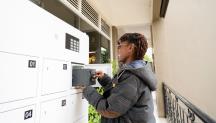

Action Needed to Balance Gender Disparity in Renewable Energy Sector
Newsletter
Today is Gender Day at COP 20, which is dedicated to advancing women's contributions to climate change action. Women are disproportionately affected by climate change, due to social status and gender roles, and can also play a key role in mitigation and adaptation efforts. Despite this, women are severely underrepresented in the decision-making process on climate change issues.
According to IRENA research, women’s talents and insights are also under-utilised in the renewable energy sector.
In all countries, gender stereotypes are a powerful roadblock which continue to restrict women’s participation in, and contribution to, the sector. But the nature of the gender gap is vastly different depending on where you are located.
In developed countries, where everyone has electricity access, women are still a minority in the renewable energy workforce, particularly among technical staff and management. Female employees make up roughly 20-25% of the sector workforce, with most women working in administrative and public relations positions. Among the key constraints are issues related to self-perception, mobility and skills. For example, the low percentage of women who graduate in the so-called STEM (science, technology, engineering, and mathematics) fields directly affects women’s participation in the renewable energy sector. Within the industry itself, barriers to women’s advancement relate not only to ingrained views and attitudes, but also to the way that workplaces are organised and influence the work/life balance.
In the majority of developing countries, women face day-to-day challenges related to cooking and lighting their households, especially in rural areas. They are often compelled to spend long hours collecting firewood and other materials for fuel, which markedly limits their ability to pursue education or find employment. In terms of employment, female employees are a minority in most rural renewable energy enterprises, particularly in managerial and technical positions. Limited capital and mobility, as well as socio-cultural restrictions, preclude a larger role for women in many modern renewable energy technologies.
Considering gender in the renewable energy equation can help address skill shortages in the industry while maximising socio-economic benefits. By removing existing barriers and working towards equal opportunity for the employment of women in the sector, the pool of talent can be substantially increased.
In developing countries, renewable energy employment provides an opportunity to address the disparity in poverty between women and men, especially considering that women represent 70% of the world’s 1.3 billion people in extreme poverty.
The inclusion of gender dimensions in renewable energy strategies and the empowerment of women in energy decisions can multiply renewable energy co-benefits, particularly those related to access, household consumption and micro-enterprises, where women are primary actors.




